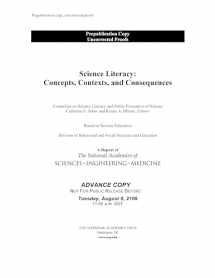
Science Literacy: Concepts, Contexts, and Consequences
Book details
Summary
Description
Science is a way of knowing about the world. At once a process, a product, and an institution, science enables people to both engage in the construction of new knowledge as well as use information to achieve desired ends. Access to scienceâ€"whether using knowledge or creating itâ€"necessitates some level of familiarity with the enterprise and practice of science: we refer to this as science literacy.
Science literacy is desirable not only for individuals, but also for the health and well- being of communities and society. More than just basic knowledge of science facts, contemporary definitions of science literacy have expanded to include understandings of scientific processes and practices, familiarity with how science and scientists work, a capacity to weigh and evaluate the products of science, and an ability to engage in civic decisions about the value of science. Although science literacy has traditionally been seen as the responsibility of individuals, individuals are nested within communities that are nested within societiesâ€"and, as a result, individual science literacy is limited or enhanced by the circumstances of that nesting.
Science Literacy studies the role of science literacy in public support of science. This report synthesizes the available research literature on science literacy, makes recommendations on the need to improve the understanding of science and scientific research in the United States, and considers the relationship between scientific literacy and support for and use of science and research.
Table of Contents- Front Matter
- Summary
- 1 Introduction
- 2 Science Literacy and Health Literacy: Rationales, Definitions, and Measurement
- 3 Science Literacy in Society and the World
- 4 Science Literacy for Communities
- 5 Science Literacy for Individuals
- 6 Research Agenda
- References
- Appendix A: Key Definitions and Statements about Literacy, Numeracy, Science Literacy, Health Literacy, and Health Numeracy
- Appendix B: Biographical Sketches of Committee Members and Staff


We would LOVE it if you could help us and other readers by reviewing the book
Book review



